
ENVIRONMENT AND DEVELOPMENT ECONOMICS
Scope & Guideline
Advancing Sustainable Solutions for Economic Growth
Introduction
Aims and Scopes
- Environmental Policy Analysis:
The journal emphasizes the evaluation of policies aimed at managing environmental resources and mitigating pollution, with a strong focus on empirical evidence and case studies from various regions. - Socioeconomic Impacts of Environmental Change:
Research frequently investigates how environmental changes, such as climate impacts and natural disasters, affect socioeconomic outcomes, particularly in developing countries. - Sustainable Resource Management:
Studies often address sustainable practices in resource management, including natural resources, water quality, and agricultural practices, with an emphasis on balancing economic interests and environmental health. - Climate Change Economics:
The journal consistently explores the economic implications of climate change, including adaptation strategies, mitigation policies, and the effects of climate variability on human capital and health. - Cross-disciplinary Approaches:
Research incorporates methodologies from various disciplines, including economics, environmental science, and social sciences, to address complex issues at the intersection of development and environmental sustainability.
Trending and Emerging
- Valuation of Environmental Services:
There is an increasing focus on the valuation of ecosystem services, particularly in urban and rural contexts, as researchers seek to quantify the benefits provided by natural resources and integrate these values into economic decision-making. - Impact of Climate Change on Human Capital:
Emerging studies examine the long-term effects of climate change on human capital accumulation, indicating a growing recognition of how environmental factors influence education, health, and economic productivity. - Integration of Behavioral Economics:
Recent papers are incorporating behavioral economics to understand how subjective perceptions and risk attitudes affect environmental decision-making, which adds a new dimension to traditional economic analyses. - Cross-sectoral Impacts of Environmental Policies:
There is a trend towards analyzing the cross-sectoral impacts of environmental policies, exploring how regulations in one area (e.g., energy) affect other sectors (e.g., agriculture, health), highlighting the interconnectedness of economic systems. - Adaptation Strategies for Vulnerable Populations:
Research is increasingly addressing adaptation strategies for vulnerable populations in the face of climate change, emphasizing the need for inclusive policies that consider socio-economic disparities and resilience building.
Declining or Waning
- Traditional Economic Growth Models:
There has been a noticeable decrease in papers focusing solely on traditional economic growth models without integrating environmental considerations. This reflects a broader shift towards more holistic approaches that incorporate sustainability. - Fossil Fuel Dependency Studies:
Research examining the economic impacts of fossil fuel dependency has diminished, possibly due to a growing consensus on the need for renewable energy solutions and the urgency of addressing climate change. - Static Analyses of Pollution Effects:
Papers that focus on static analyses of pollution effects without considering dynamic interactions or long-term consequences are less frequent, indicating a move towards more comprehensive and dynamic modeling in environmental economics. - Regional Studies with Limited Scope:
While regional studies remain important, there is a decline in research that solely focuses on localized issues without broader implications, as the journal increasingly favors studies with global or comparative relevance.
Similar Journals

Indian Journal of Economics and Development
Navigating the Complexities of Economic GrowthIndian Journal of Economics and Development, published by SOC ECONOMICS & DEVELOPMENT, stands as a noteworthy platform for scholarly discourse in the fields of economics, business management, and development studies. With an ISSN of 2277-5412 and an E-ISSN of 2322-0430, this journal, based in Ludhiana, India, has been dedicated to advancing research and dialogue since its inception in 2019 and is poised for convergence until 2024. Although currently ranked in the Q4 categories across various disciplines in Business, Management and Accounting, Economics and Econometrics, and Geography, Planning and Development, the journal’s commitment to fostering impactful research is evident in its wide-ranging aims and scope, which seek to explore contemporary economic challenges and developmental issues. While the journal operates without an open-access model, it provides a valuable resource for academics and professionals, and encourages contributions that address both theoretical and empirical questions. Researchers, students, and professionals will find this journal critical as it serves a vital role in the dialogue surrounding economic and developmental dynamics, particularly in an increasingly complex global landscape.
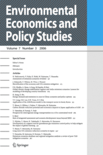
Environmental Economics and Policy Studies
Transforming Economic Perspectives on Environmental ChallengesEnvironmental Economics and Policy Studies is a premier academic journal published by SPRINGER, focusing on the intersection of environmental sustainability and economic policy. With a robust ISSN of 1432-847X and an E-ISSN of 1867-383X, this journal serves as a vital resource for researchers, policymakers, and practitioners looking to understand and address the complex issues surrounding environmental economics. Hailing from Japan, it has carved a significant niche in the field since its inception, achieving impressive rankings with a Q2 classification in both Economics and Econometrics, as well as Management, Monitoring, Policy and Law as of 2023. The journal publishes a wide array of high-quality articles, with an emphasis on empirical research and innovative methodologies that influence public policy and economic decision-making. Notably, its Scopus rankings reflect a respectable position within its disciplines, with a percentile ranking of 74th in Economics and Econometrics. The journal continues to contribute to the discourse on sustainable development with a commitment to fostering interdisciplinary research and understanding. Access to this invaluable resource is available through traditional subscription models, making it an essential addition to academic collections for those passionate about the advancement of environmental economics.
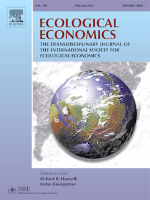
ECOLOGICAL ECONOMICS
Integrating Nature and Economy for a Sustainable Future.ECOLOGICAL ECONOMICS, published by ELSEVIER, stands as a premier journal dedicated to the integration of ecological and economic thinking, exploring the complex interactions between human and natural systems. With an impactful history dating back to 1989, the journal has solidified its position in the academic community, evidenced by its classification in the top quartiles (Q1) of both Economics and Econometrics and Environmental Science categories for 2023. ECOLOGICAL ECONOMICS boasts impressive Scopus rankings, holding the 32nd position out of 716 in Economics and Econometrics and 19th among 233 in General Environmental Science, reflecting its substantial influence and reach. Although it does not currently offer open access options, the journal remains a vital resource for researchers, professionals, and students interested in sustainable development, environmental policy, and resource management. The ongoing convergence of various fields within ecological economics promises to yield valuable insights and foster interdisciplinary collaboration, making this journal an essential component of scholarly discourse.
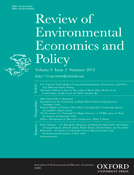
Review of Environmental Economics and Policy
Advancing the Dialogue on Economics and Environmental StewardshipThe Review of Environmental Economics and Policy is a premier journal published by University of Chicago Press, dedicated to advancing the field of environmental policy and economics. Since its inception in 2008, the journal has provided a vital platform for interdisciplinary research that merges economic theory with environmental practice, highlighting its significance in addressing contemporary challenges such as climate change, resource management, and sustainability. With an impressive impact factor that places it in the Q1 quartile across both the Economics and Econometrics, and Management, Monitoring, Policy and Law categories, it ranks highly within Scopus, specifically at 43rd out of 716 and 39th out of 399, respectively. The Review of Environmental Economics and Policy is committed to disseminating high-quality research that not only informs policy-making but also engages a diverse audience of researchers, practitioners, and students. Although it is not an open-access journal, its contributions are indispensable for anyone looking to understand and influence the nexus of economics and environmental stewardship.

Economia Agraria y Recursos Naturales
Connecting Scholars to Drive Sustainable Resource ManagementEconomia Agraria y Recursos Naturales, published by UNIV POLITECNICA VALENCIA, EDITORIAL UPV, is a prominent open-access journal that has been serving the fields of agricultural and biological sciences, environmental science, and geography since 2001. With an ISSN of 1578-0732 and an E-ISSN of 2174-7350, this journal is dedicated to publishing high-quality research that contributes to the sustainable management of natural resources and agricultural practices. The journal invites scholars, practitioners, and students to explore and share innovative findings that address pressing environmental challenges. While currently categorized in the lower quartiles (Q4) for various disciplines in 2023, its open-access model ensures wide dissemination and visibility for authors and their work, aligning with the growing trend towards accessibility in academic publishing. Positioned in Spain, Economia Agraria y Recursos Naturales is a valuable resource for those seeking to engage with the intersection of agriculture, environmental studies, and policy planning within a global context.

Nativa
Fostering interdisciplinary dialogue for sustainable development.Nativa, published by the Universidade Federal de Mato Grosso in Brazil, stands as a prominent open-access journal since 2013, dedicated to the dissemination of research across various domains of Agricultural and Biological Sciences. With its ISSN 2318-7670, Nativa aims to foster scholarly communication and collaboration among researchers and practitioners worldwide. The journal occupies notable positions within the Scopus rankings, with a Q3 classification in several categories, including Agricultural and Biological Sciences (miscellaneous) and Environmental Science (miscellaneous), while also holding a Q4 classification in areas such as Agronomy and Crop Science and Animal Science and Zoology. This positioning reflects its commitment to advancing knowledge and understanding crucial to sustaining and enhancing our natural resources. Nativa seeks to engage a diverse readership by providing a platform for innovative research, fostering interdisciplinary discourse, and addressing pressing environmental challenges and conservation efforts essential for sustainable development.
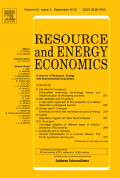
RESOURCE AND ENERGY ECONOMICS
Empowering Economists to Tackle Global Energy IssuesRESOURCE AND ENERGY ECONOMICS is a premier academic journal published by ELSEVIER, specializing in the intricate fields of economics and econometrics with a particular focus on the intersection of resource management and energy policy. Established in 1993, the journal has been a vital platform for scholars and professionals, contributing to significant advancements in the understanding of economic aspects surrounding natural resources and energy systems. With an impressive impact factor and ranking in the top quartile (Q1) of its category, it is recognized for its rigorous peer-reviewed research that informs both academic inquiry and practical applications in the industry. The journal is based in the Netherlands and caters to a global audience, fostering interdisciplinary discussions aimed at addressing pressing environmental and economic challenges. Accessible primarily through institutional subscriptions, RESOURCE AND ENERGY ECONOMICS continues to shape the discourse in its field, making it an essential read for researchers, policymakers, and practitioners striving for innovative solutions in resource and energy economics.

Agricultural and Resource Economics-International Scientific E-Journal
Connecting scholars and practitioners in resource management.Agricultural and Resource Economics-International Scientific E-Journal is a leading open-access publication dedicated to advancing the fields of agricultural and resource economics. Published by the esteemed INST EASTERN EUROPEAN RESEARCH & CONSULTING since 2015, this journal provides a vital platform for innovative research and discourse, particularly within the context of Eastern Europe. With an impressive Q2 ranking in Agricultural and Biological Sciences and Q3 rankings in both Business, Management and Accounting and Marketing, it serves as a key resource for academics and practitioners alike, fostering collaboration and knowledge exchange. The journal's commitment to accessibility and inclusivity is evident through its open-access policy, allowing researchers from around the globe to share and benefit from cutting-edge findings. Set against the backdrop of a rapidly evolving agricultural landscape, this journal plays a crucial role in exploring the intersection of economics, sustainability, and resource management, making it an essential read for anyone invested in the future of these critical fields.
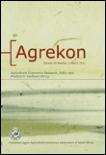
Agrekon
Advancing Agricultural Insights for Economic GrowthAgrekon, published by ROUTLEDGE JOURNALS, TAYLOR & FRANCIS LTD, serves as a premier academic platform in the fields of Agronomy, Economics, and Geography, with a focus on the intersection of agricultural practices and economic development. With an ISSN of 0303-1853 and an E-ISSN of 2078-0400, this esteemed journal boasts a commendable academic standing, reflected in its 2023 quartile rankings of Q2 in Agronomy and Crop Science and Geography, Planning and Development, and Q3 in Economics and Econometrics. Established in 1962 and running through 2024, Agrekon continues to be a vital resource for researchers, professionals, and students committed to advancing knowledge in sustainable agricultural practices, economic policies, and spatial development issues. The journal is not open access, yet its findings and discussions are highly regarded within the academic community, offering insights that drive innovation and inform policy decisions across the globe. Engaging with Agrekon equips scholars with a rich compendium of research that bridges theoretical knowledge and practical application in the agricultural and economic sectors.
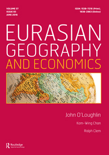
EURASIAN GEOGRAPHY AND ECONOMICS
Unveiling the Forces Shaping Eurasian Landscapes and EconomiesEURASIAN GEOGRAPHY AND ECONOMICS, published by Routledge Journals, Taylor & Francis Ltd, is a premier academic journal that delves into the intricate interplay between geographic and economic forces shaping the Eurasian region. With an impressive impact factor and ranked in the top quartile (Q1) for both Economics and Geography in 2023, this journal serves as an essential resource for researchers, professionals, and students alike. The journal spans a diverse range of topics from spatial analysis to economic development, contributing significantly to our understanding of these dynamic fields. As it celebrates its convergence from 2002 to 2024, EURASIAN GEOGRAPHY AND ECONOMICS continues to foster scholarly dialogue with its innovative open-access options, ensuring that vital research is widely accessible. Explore the latest findings, trends, and methodologies presented by leading experts in the field, and engage with the high-quality, impactful studies that make this journal a cornerstone of academic excellence.